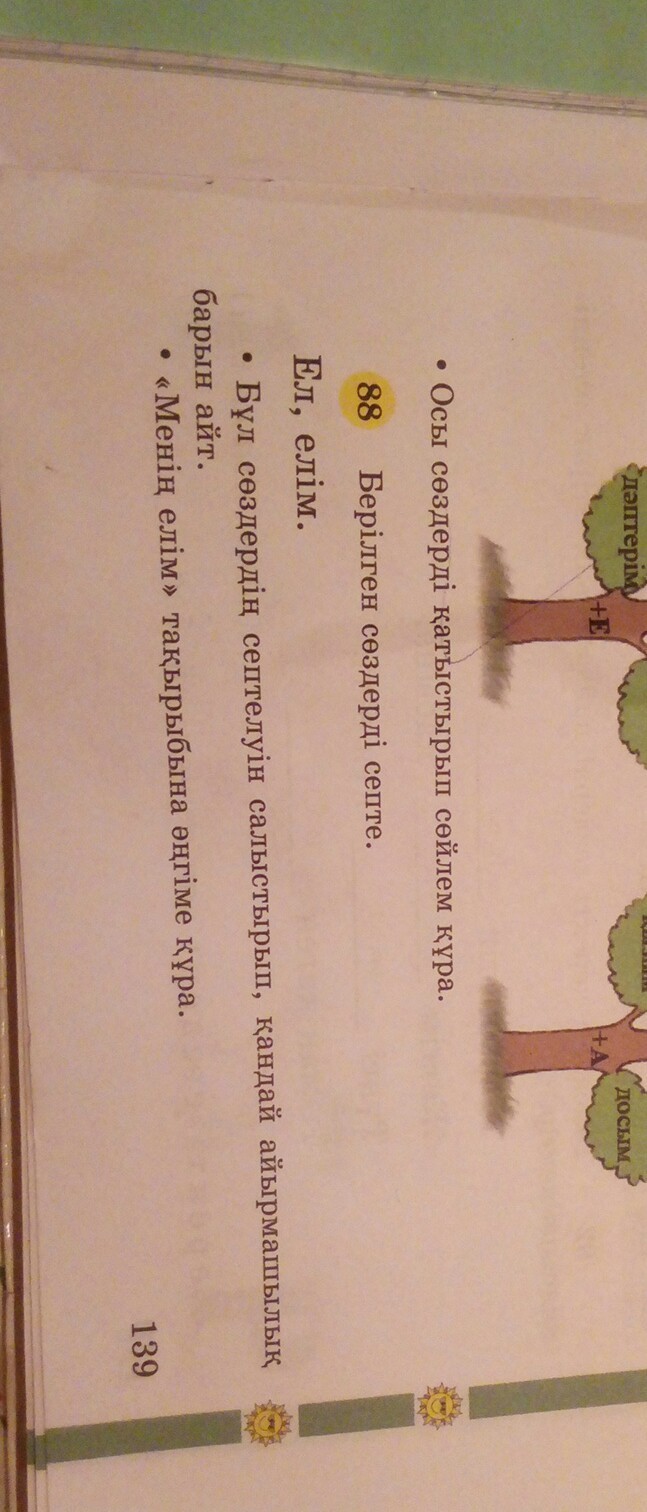Казак тили 4 сынып 88 жаттыгу 139 бет. Менин елим такырыбына ангиме курау

Ответы
Ответ:
Менің елім.
Менің кіндік қаным тамып, алғаш тәй-тәй басқан, алғаш «ана» деп күлім қаққан, киелі жерім, атамекенім бар, ол – тәуелсіз Қазақстан. Халық даналығы «Әркімге өз туған жері Мысыр шаһары» деп бекерге айтпаған.
Төбесі көкке тірелген таулары бар, көк-жасыл орман-тоғайлары бар, асу-асу белдері бар, қойнауы алтын астық пен малға толған кең жазира даласы бар Қазақстан әлемге әйгілі өте бай ел. Ұлан - байтақ далада төсін кеңге жайған, табиғаты әр алуан жан -жануарларға толы, аққулы көлдері бар, тулаған толқынды теңіздері бар, әсем қалалары бар достығы жарасқан көпұлтты мемлекет. Әнұранымен әйгілі, Туымен тұғырлы, Елтаңбасымен еңселі егемен елімізге қызыға қарамайтын ел жоқ шығар.
«Отансыз адам - ормансыз бұлбұл» демекші, мен өз елімді мақтан тұтамын. Елбасымыздың салиқалы саясатының арқасында жыл өткен сайын еліміз қарқынды дамып келеді. Қазақстанның әлемдік картада өзіндік ерекше орны бар. Қазақстандай дархан елде қаншама ұлт өкілдері тату - тәтті, бейбіт өмір сүріп жатыр.
«Отан оттан да ыстық» екені баршамызға мәлім. Туған жерін жырға қоспаған, туған жері жайлы толғанбаған ақын-жазушылар жер бетінде жоқ шығар.
Менің туып - өскен жерім егеменді Қазақстан. Қазақстанның байлығы өте көп және пайдалы қазбаларға бай ел. Біздің еліміздің табиғаты өте сұлу. Биік-биік асқар тау, мөп-мөлдір көлдер, неше түрлі өсімдіктер мен дәрілік қасиеті бар шөптер өседі. Қазақстан жерінде аңдар мен құстар, неше түрлі жануарлар өмір сүреді.
Қазақстанның кең даласындай байтақ дала еш жерде жоқ шығар. «Отаның-алтын бесігің», «Отаны жоқтық нағыз жоқтық»- деп дана халқымыз бекер айтпаған. Өз Отанын сүю, өз ана тілін ардақтау әрбір азаматтың бірінші міндеті. Ал біздің халқымызда атамекенді ардақтау сезімі өте терең деп ойлаймын. Халқымыздың басынан қандай қиын кезеңдер өткенде де ата-бабаларымыз елімізді сыртқы жаудан қорғай білген. Сондықтан ойымды «Туған жердей жер болмас, туған елдей ел болмас» деген мақалмен тәмамдағым келеді.